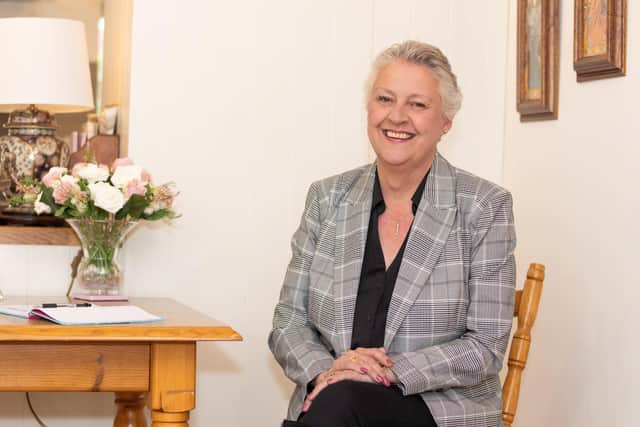Pancreatic cancer: Berkhamsted woman initially given 'months to live' backs campaign for early diagnostic testing research
and live on Freeview channel 276
A Berkhamsted woman is supporting Pancreatic Cancer UK’s ‘Unite-Diagnose-Save-Lives’ campaign to fund research which could give more people the chance of getting life-saving treatment.
Jenny Oldfield was not diagnosed with pancreatic cancer until it had already spread – and was initially given three months to live.
Advertisement
Hide AdAdvertisement
Hide AdShe said: “The first thing you do is Google it, and of the 80 per cent of people who are diagnosed with stage four, more than half of people die within three months. I was 56 at the time. It's a shocker.”


Jenny, who ran her own business for 20 years, began experiencing symptoms and losing weight rapidly after her birthday in March 2021.
Her scans showed the cancer was too advanced to have surgery, which is the only potential cure for pancreatic cancer. But she is responding well to life-extending chemotherapy and is making the most of the time she has left.
According to Pancreatic Cancer UK, the major cause of late diagnosis is pancreatic cancer’s vague symptoms like back pain and indigestion and unexpected weight loss.
Advertisement
Hide AdAdvertisement
Hide AdJenny said: “It’s massively important we find more tools to help doctors diagnose this disease. It's really important how many people must get dismissed and told that they've got Irritable Bowel Syndrome.”


She added: “I think if circumstances had been different if I hadn't had the rapid weight loss and I hadn't had the doctor who just left A&E. If I'd have been told at that stage that it was IBS and I was still waiting, I'd be dead now.”
No screening programmes or early detection tests exist for pancreatic cancer, meaning CT scans are the only tools doctors use to diagnose the disease in time to save lives.
Despite causing a death of a similar number of people annually as breast cancer, pancreatic cancer receives 93% less research funding.
Advertisement
Hide AdAdvertisement
Hide Ad72 per cent of GPs polled by Pancreatic Cancer UK are concerned that the Covid-19 cancer diagnostic backlog may continue to prevent people with pancreatic cancer from being diagnosed in time for potentially lifesaving treatment.
Jenny said: “I don't want anyone else to be in the same position as me. None of this is going to help me, and I get that. I don't want to miss the opportunity of making this matter because there's a reason this has happened and I'm going to get something positive out of it.”
The charity has invested £1.6 million into the Pancreatic Cancer UK Early Diagnosis Research Alliance and has created a blood test which is proven to be highly accurate in lab trials.
The charity is urging the public to help fund the development of the first simple test for the disease.
Advertisement
Hide AdAdvertisement
Hide AdDiana Jupp, CEO of Pancreatic Cancer UK, said: “We have to give doctors the innovative new tools they need to detect the warning signs earlier, so they can ensure those who need it, receive treatment as soon as possible.”
People can support Pancreatic Cancer UK here.

